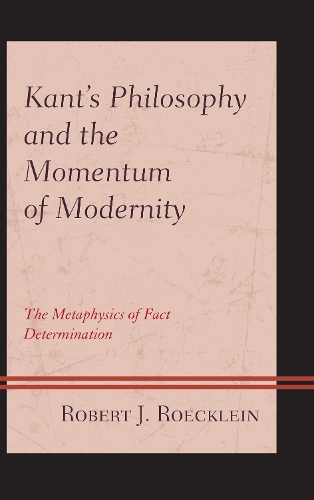
Kants Philosophy and the Momentum of Modernity: The Metaphysics of Fact Determination
(Hardback)
Publishing Details
Kants Philosophy and the Momentum of Modernity: The Metaphysics of Fact Determination
By (Author) Dr. Robert J. Roecklein
Bloomsbury Publishing PLC
Lexington Books
8th February 2019
United States
Classifications
Professional and Scholarly
Non Fiction
Western philosophy from c 1800
Philosophy: metaphysics and ontology
Political science and theory
193
Physical Properties
Hardback
424
Width 162mm, Height 229mm, Spine 36mm
753g
Description
This book is both a careful study of Immanuel Kants work and the context of that work in the movement known as early modern philosophy. The chief interest of the author concerns the philosophy of perception that is manifest in Kants doctrines of the transcendental aesthetic and the concept of phenomena. Philosophy bears a crucial relationship to the public in terms of the evidence that it identifies as original and binding. In the early modern period, philosophy repudiated its dependence on ordinary perception, and on language as ordinarily used, in the setting forth of its own authority. This historiographical fact is presently of immense interest, as public discourse finds itself rudderless and without agreed upon common facts for deliberation to settle on. It was not the view of the ancient Greeks that philosophy could so emancipate itself from the perception of common facts as the original evidence for higher investigations. The Early Modern era, beginning with Bacon but now more furiously in the work of Kant, has anchored a general indictment of ordinary perception in a remnant of natural philosophy. Human beings, in Kants philosophy, are not capable of knowing what objects, external objects, are in themselves. We may only know what are called "appearances," and Kant refers to these appearances as phenomena. Yet this claim is complicated by the a priori knowledge which Kant claims to possess as regards these phenomena: that they must all be eternal substances. The book freely moves back and forth between Greek antiquity and the Early Modern period to illustrate the full nature of the rupture on this ground of the metaphysics of fact determination. For Aristotle, the founder of the theory of substance, substances are just the perishable bodies commonly perceived. Kants phenomena, which claims to embody what appears to the generality of the human race, cannot be that, for the human race does not perceive eternal objects.
Reviews
Robert Roeckleins Kants Philosophy and the Momentum of Modernity takes up the quarrel of the ancients and moderns in novel ways, exposing the Epicurean roots of modern thinking. He does so principally through a vigorous critique of Kants distinction between phenonena and noumena and then elaborating its pernicious implications for ethics and politics. The case is fiercely argued. While the reader may not agree with all of Roeckleins arguments, the book should provoke new assessments of Kant's relationship to the early Enlightenment and postmodernity. -- Marc Sable, Bethany College
Author Bio
Robert J. Roecklein is teaching professor of rhetoric and political philosophy in the Behrend College at Penn State Erie.
